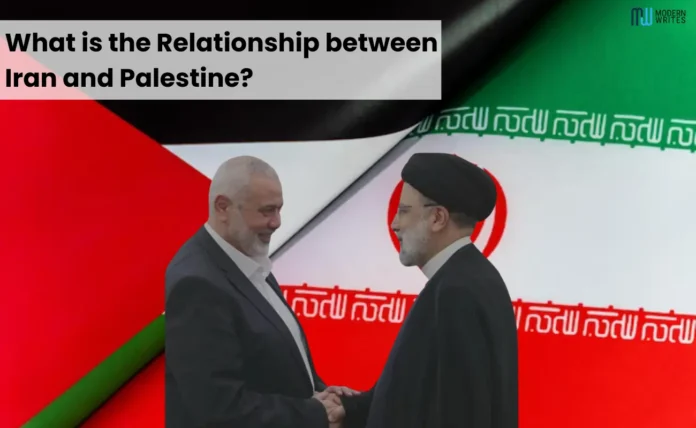Iran and Palestine experience a many-faceted emotional connection where philosophy, geography, and economic pros and cons play important parts. Causing the conflict between Palestine and Israel and increasing the anti-Israel sentiment that both groups share is at the root of the movement. Iran and Palestine
While the common characteristics of the area play a major role, different dynamics, affected by historical background and shifting alliances, obvious variety. This article literally deals with the varied relationship (its stickiness) between Iran and Palestine. Here, we cover not only unity but also the geopolitical affairs that guide this relationship.
Iran considers the Palestinian cause to be a holy struggle that has been ongoing since 1979, the year of the Islamic Revolution. Iran-Palestine relations that were part of the past are about to continue for decades, based on historical context. Iran and Palestine
“Ayatollah Khomeini“ the leader of the Islamic revolution, was the one who described Israel as polytheistic. In response, he required Israel’s destruction from the planet.
This ideology of those scholars discovered the basis of Iran’s staunch stand against the Palestine movement, which also forms the identity of Muslims against wrong and repression. Iran has been backing Palestine constantly since the first years of this century. Iran shows specific support for Palestine, not only through words but also financially, militarily, and politically. This is a unity display that enables Iran to face geopolitical facts.
By providing economic aid, Tehran indicates its support for Palestinian terrorist organizations such as Hamas and Islamic Jihad. Tehran views those as resistance forces inserted within Israeli limits. Iran and Palestine
Iran provided weapons to Palestinian Iran and Palestine
In summary, Iran has mostly provided Palestinian terrorists with weapons and training to enhance their strengths for use in clashes against Israeli soldiers. On the other hand, the Iranian desire to support Palestine, as well as the war against Israel, has led them to work with terrorist groups. Iran and Palestine
- We appreciate Iranian support because they consistently bolster the Palestinian struggle by persuading the rest of the world that they are right and deserve their own independent state.
- This is why Palestinians recognize and utilize Iranian assistance in these ways. They view Iran as one of their primary allies, as it is prepared to provide physical assistance in the process of removing the Israeli occupation, regardless of the Islamic values that both parties may hold.
- Besides, the Iranian backing also makes it possible for the Palestinians to increase their power vis-à-vis their need in the negotiations and their standing on the international arena. Nevertheless, Jews represent their cultural identities as a nation that originated in a non-Arab country, a country with a Shiite majority.
- However, Iran’s quest to assert itself as an influential force in the Middle East arena could trigger hostility from Arab countries and the broader Sunni Muslim world.
Iran strategically calculates its efforts to address the Palestinian issue in order to achieve more successes and establish its dominance in the region. However, Iran’s ideological solidarity with Palestine and regional dynamics beyond this article’s scope blur the lines between domestic considerations and international relations. By supporting Palestinian forces, Iran is attempting to challenge the regional dominance of its rivals, particularly Saudi Arabia and Israel.
Anti-Israeli Iran and Palestine
Iran influence the support of its anti-Israeli proxies to fortify its position and strive for de facto local governance, a direct response to the Israeli government’s policy of dividing and weakening its opponents. Iran and Palestine
Iran’s involvement in Palestine’s affairs is not the only challenge. The Iranian government must address several challenges.
- The partisan differences between Sunni-dominant governments and Shia Iran pose a challenge to Tehran’s coincidence with the Arab nations of the Middle East.
- Tehran’s shifting alliances with the Sunni Arab nations, which have targeted Iranian-supported Shia militant groups in Lebanon like Hezbollah, have contributed to the strain on relations.
- Some of these regimes argue that Iran is to blame for the tension existing between different components of the region and for instability in this area.
The Western world has also disapproved of Iran’s support for Palestinian militants. This act has once again isolated Tehran, making it an outcast on the international scene.
The local dynamics have a significant impact
For the past few years, there have been big and dramatic changes in the political scene. These changes have created a kind of interference in the traditional friendship relations between Iran and Palestine.
Recently, the United States, through the Abraham Accords, has been acting as a key driver behind the normalization of diplomatic relations between a number of Arab states and Israel. Iran and Palestine
As a result of the change in the Middle East’s geopolitical space, power transferred. At the same time, on the one hand, it may transform Iran’s political power position to a limited extent, but on the other hand, this trend opens up the prospects for people to unite who are not against this event of Israeli imperialism and to form alliances.
On the other hand, relevant domestic issues Iran faces, such as economic sanctions or a broken political system, clearly impact its ability to support Palestinians. In light of this situation, chances are that Tehran’s delivery of consistent support and aid to Palestinian factions may be cut in this respect due to availability or imposed external factors.
This might perhaps develop into a control factor and change the balance of power in the Israeli-Palestinian conflict.
Conclusion Iran and Palestine
One could argue that the connection between Iran and the Palestinian territories indicates the complex connecting of basic and government thinking in the Middle East. We cannot measure this linkage solely by focusing on Israel’s opposition with Palestine and mutual support against its policies, but also by examining regional dynamics, historical context, and moving networks of relations. Iran and Palestine
Although the partnership between Iran and Palestine may not be seamless due to the shared challenges in the Middle East, their bond remains unwavering as they fight for their freedom from Israeli occupation. It is still the same, especially if they both fight barriers and problems of their own in the process of fulfilling their individual desires. Iran and Palestine





